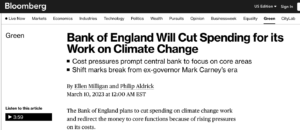By Ellen Milligan and Philip Aldrick
Bank of England Will Cut Spending for its Work on Climate Change

Cost pressures prompt central bank to focus on core areas
Climate programs will slip lower on the central bank’s agenda so officials can focus more on the core operations such as financial stability, markets and a digital currency, according to a person with knowledge of the situation who asked not to be named.
The BOE’s climate work currently focuses on building ESG disclosure guidelines, preparing insurers for risks from rising global temperatures and getting banks to carbon-test their balance sheets.
Despite the BOE’s focus on climate, the bank has come under frequent attack from activists who wanted it to press harder on decarbonising the economy through the financial system. They’re calling for green quantitative easing to fund the transition away from fossil fuels and toward “net zero” greenhouse gas emissions.
The challenge of climate change will remain one of the BOE’s seven strategic priorities until next year, but funding has already been cut now that its carbon stress test for the banking system has ended.
#

London, 13 March – Net Zero Watch has welcomed the decision by the Bank of England to demote its Net Zero agenda and cut its spending on climate change.
According to reports, the bank’s climate programmes will be downgraded so that officials can return to work on its main remit, namely the nation’s financial stability.
The bank has been widely blamed for allowing inflation to rocket to more than five times the bank’s 2% target.
Its obsession with climate change, promoted and pushed through by its former governor, Mark Carney, in tandem with government ministers, has for years distracted it from its main responsibilities. Instead, it has been enforcing ESG disclosure guidelines, carbon-testing balance sheets and promoting Net Zero policies.
During his time as Governor, Net Zero Watch criticised Mr Carney repeatedly, warning that his climate activism and his intimidation of financial institutions and pension funds into costly Net Zero targets would eventually lead to policy failure and a distressed correction. This correction appears to have now begun.
Last year, Net Zero Watch criticised the Bank’s so-called ‘climate stress test’, which used discredited projections of a global temperature change of 3.3°C by 2050, far exceeding even the IPCC’s much-criticised SSP5-8.5 scenario.
Dr Benny Peiser, Net Zero Watch’s director, called on the Bank of England and the Financial Conduct Authority to accept that the risk of costly climate and Net Zero policies have become a bigger threat to the UK’s economy and financial stability than climate change.
“Unless the Bank of England abandons its fixation with green virtue-signalling, it is only storing up more problems for the economy and the UK’s financial system.”
Contact
Dr Benny Peiser
Director, Net Zero Watch


